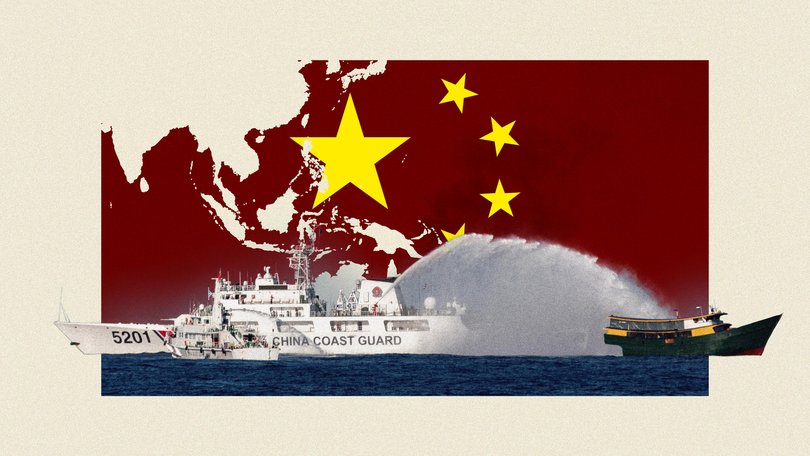Australia Institute: Aussie think tank defends Beijing’s South China Sea claims days after RAAF confrontation
A Canberra think tank has been criticised over a paper emphasising China’s claims to the disputed South China Sea in the same week the country forced an Australian surveillance plane from the area.

A leading progressive Canberra think tank is being criticised for emphasising the Chinese Communist Party’s policies on the South China Sea in the same week as the People’s Liberation Army “dangerously” forced an Australian surveillance plane from the area.
The Australia Institute’s research paper entitled “How China Sees the South China Sea - Beijing’s policy and interests in the South China Sea disputes” has been published in both English and Mandarin.
According to the institute its newly released report contains “ground-breaking new bilingual research” which “reveals how tensions in the South China Sea are misunderstood and misrepresented in Australia”.
Sign up to The Nightly's newsletters.
Get the first look at the digital newspaper, curated daily stories and breaking headlines delivered to your inbox.
By continuing you agree to our Terms and Privacy Policy.“The often-repeated claim that China is aggressively expanding into the territory of neighbouring countries is an oversimplification of long-running tensions involving many nations, and based on misunderstandings of China’s military and economic interests”.
“Australia sails its warships in the South China Sea to Challenge China’s maritime claims”, writes Frank Yuan, a Postdoctoral Fellow at The Australia Institute and the lead author of the publication.
“Yet Australian coverage of the territorial disputes rarely takes into account the perspectives of the different claimant – not least China – such as the history of China’s policy, the details of its claims, and its recent diplomacy with other claimants”.
According to the authors, who also include Allan Behm, a former senior advisor to now Foreign Minister Penny Wong, the dual-language report is “a gesture towards prompting greater dialogue and improve mutual understanding”.
“In addition to providing an analysis of Beijing’s policy in the region, a work of this nature by an overseas observer might also provide those in China with some additional insight into the concerns and interests of other parties”.
The authors have also expressed their “gratitude” to Professor Wanning Sun from the Australia China Relations Institute (ACRI) at the University of Technology Sydney, who provided feedback on the Chinese language draft of the report.
Over recent years critics have accused ACRI, founded by controversial businessman Huang Xiangmo, of being too close to the Chinese Communist Party and for not properly disclosing funding linked to state-owned enterprises controlled by Beijing.
Australia Institute founder Clive Hamilton, an outspoken critic of the Chinese Communist Party, has again criticised the organisation he helped to establish, accusing it of being too close to Beijing.
“At the launch of the Australia Institute in 1994, Justice Michael Kirby urged us to always stand up for the victims. When I ran the Institute that’s what we tried to do,” Professor Hamilton tells The Nightly.
“It’s distressing to see the think tank I founded become a mouthpiece for an authoritarian regime. This latest paper reproduces the lies and distortions routinely found in the People’s Daily.”
Earlier this month the former Greens candidate said the progressive think tank he founded more than three decades ago had become so obsessed with the United States that it downplayed China’s authoritarian impulses.
In September the Guardian reported that a charity belonging to West Australian mining magnate Andrew Forrest had made an “undisclosed donation” to the institute apparently worth “six figures”.
The Albanese government has declined to comment on the report, but this week Defence Minister Richard Marles accused Beijing of “unsafe and unprofessional” conduct after a Chinese aircraft released flares close to an RAAF surveillance plane.
Beijing has hit back at Australia following the weekend military confrontation, accusing the defence force of distorting facts and covering up its own “vile act” of illegal intrusion.
Over recent weeks the Philippines has accused Chinese maritime forces of using water cannons and ramming a Filipino boat near disputed islands in the South China Sea, describing the actions as a “clear threat”.
In a statement to The Nightly, a spokesperson for The Australia Institute defended its research publication, saying: “we often say we barrack for ideas, not political parties. To be clear, we don’t barrack for nations either”.
“As a research organisation, we believe that our democracy is improved when people have access to a broad range of information and analysis, and that applies to understanding Australia’s foreign policy and our place in the world.”
“We believe that if ever there was a time for a wide range of informed, diverse, open-minded research, it is now,” the spokesperson added.

